blood
Latest

Scientists make a lifelike robotic fish using multipurpose 'blood'
There's no question that robots have come a long way since their cold, clunky, cumbersome inception. Nowadays they're smart, agile and responsive -- but they're still missing the tactile, multipurpose elements that make living creatures flexible and autonomous. Until now. In a bid to make robots more lifelike, scientists have created a soft robotic lionfish and have pumped it full of life-giving "blood."
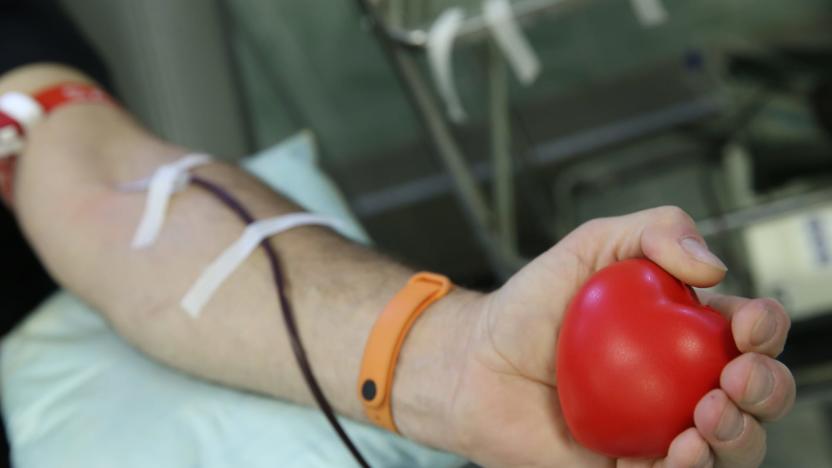
FDA: Infusing yourself with young blood is pointless, dangerous
The US Food and Drug Administration has stepped in to officially warn consumers against buying young blood in an attempt to improve their health. Yes, enough people thought it would be a good idea to infuse young blood -- an actual plot from The Simpsons' -- that the government had to intervene.

DNAFit's at-home blood test wrote my 2019 resolutions for me
What do you get the amateur athlete who already bought the fancy shoes, had their gait analyzed and owns a too-tight triathlon onesie? Genetic testing, of course. It's in this field that weekend warriors are now looking for ways to shave seconds from their times. Peeping at your genes can only tell you so much, which is why companies like DNAFit are expanding.

Synthetic blood will keep trauma victims alive for up to 48 hours
Despite numerous advances in emergency medical care over the past decade, humans are still susceptible to bleeding out like Hefty bags filled with vegetable soup. This is especially problematic when people are seriously injured in remote areas or combat operations. Some 17,000 people die from hemorrhagic shock in the US annually (that's roughly 46 people per day). What's more, the American medical community could soon face significant shortages of transfusable blood stocks. Per a 2011 analysis from the National Blood Collection and Utilization Survey, the US could see a shortfall of around 4 million units of blood annually by 2030.

FDA approves first Zika test for blood donations
While the Zika virus is primarily transmitted by mosquito bites, it could also be passed through blood transfusion. To ensure that nobody who needs transfusion in the US gets infected, the US Food and Drug Administration has approved the first test that can screen Zika in blood donations. The cobas Zika test can detect the virus' RNA in plasma taken from donated whole blood and blood components. It can't be used to diagnose infection, but it can keep the country's blood supply Zika-free.

Facebook wants to simplify blood donor searches in India
Facebook is lending a hand to help solve India's safe blood shortage. Its solution is to leverage its popular social network to put people in touch with blood donors. Starting in October, users in India will be able to sign up to become donors via their profile or by clicking on a designated promo message on the News Feed. The tool will ask you to submit info, such as your blood type and whether you've donated blood before. Facebook promises to keep your details private, but you can choose to share a simple donor status with others on the timeline.
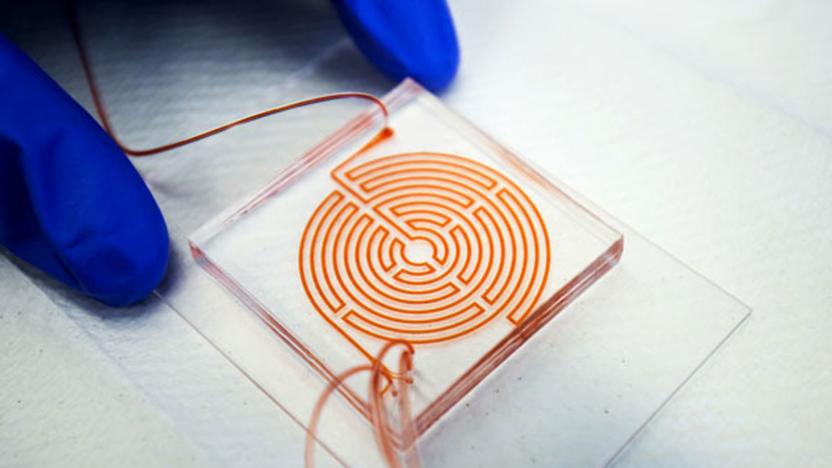
Maze-like chip helps spot aggressive cancer cells
It's difficult to spot cancer cells -- just one in a billion blood cells are cancerous. How do you isolate them to know the trouble someone is facing and eventually treat it? By drawing the kind of mazes you enjoyed as a kid, apparently. Researchers have developed a microfluidic chip that uses a circular labyrinth to separate cancer cells from the rest of your bloodstream and spot the stem-like cells that will aggressively spread that cancer. Ultimately, it's a creative use of physics. The curves tend to push larger cancer cells forward (smaller regular cells cling to the walls), while the corners mix things up and put white blood cells in an ideal position.
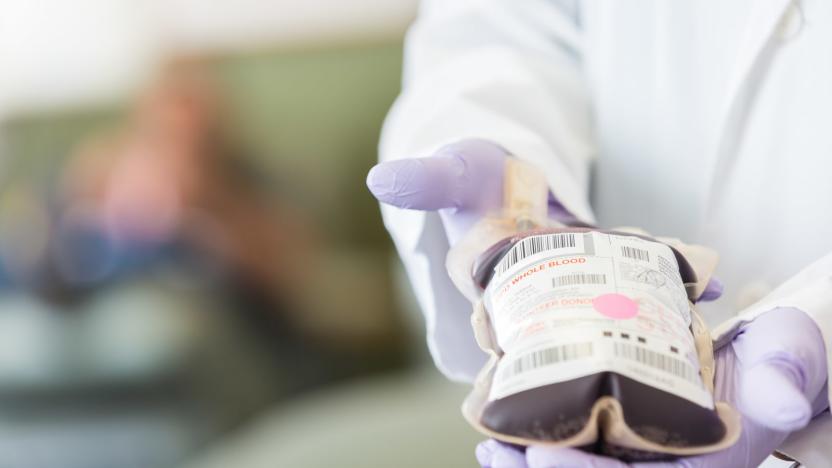
Mass-produced artificial blood is now a real possibility
Doctors dream of having artificial blood always on hand, but the reality has usually been very different. While you can produce red blood cells in a lab, the current technique (which prods stem cells into action) only nets a small number of them at best. British researchers appear to have found the solution, however: they've developed a technique that can reliably produce an unlimited number of red blood cells. The trick is to create "immortalized" premature red blood cells that you can culture as much as you like, making mass production a real possibility.
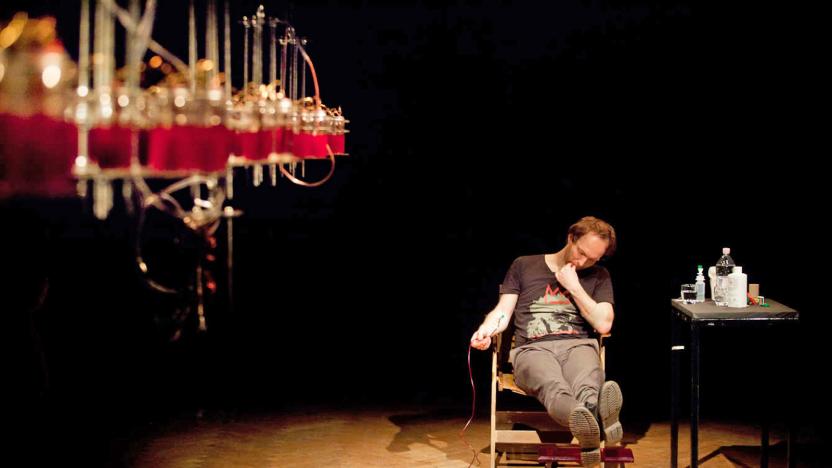
Artist runs an electronic sound exhibit using his own blood
Russian artist Vtol is no stranger to making sounds with unusual technology, but one of his latest projects might top them all. He recently created Until I Die, an electronic sound installation powered by himself -- namely, his blood. His creation uses vital fluid as an electrolyte that, when combined with metals like aluminum and copper, results in direct current batteries. The project isn't about to compete with the battery in your phone (five batteries manage a capacity of just 1,000mAh), but that's enough to power a synth module and speaker for roughly 8 hours.
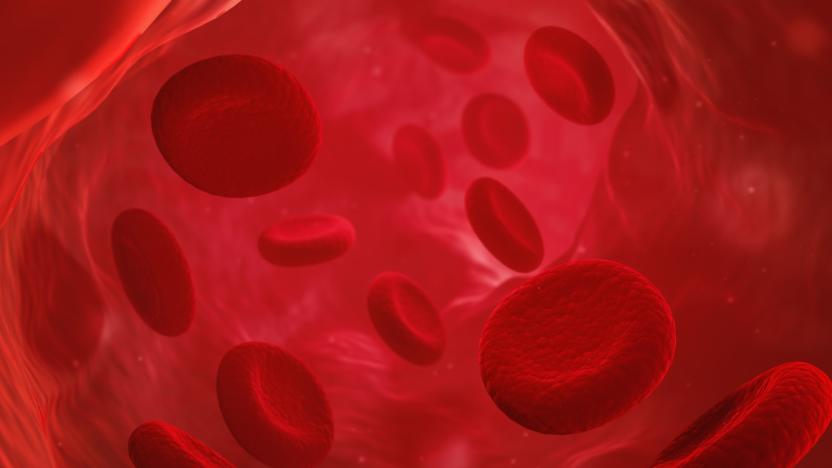
Scientists rejuvenate blood by reprogramming cells
Like it or not, your body gradually loses its capacity for producing blood as you age -- that's why immune deficiencies, leukemia and other blood conditions become more likely with time. Scientists may have found a way to turn back the clock, though. They've found a way to rejuvenate blood by reprogramming the stem cells that create it. The team effectively "resets" the stem cells by turning them into iPS cells, which can generate any kind of cell. When they once again form blood stem cells, it's as if they were brand new.

ICYMI: A medical breakthrough inspired by a kids toy
try{document.getElementById("aol-cms-player-1").style.display="none";}catch(e){}Today on In Case You Missed It: Stanford bioengineers created a centrifuge to separate blood and detect disease, all based on whirligigs from childhood. They estimate the blood cell device would cost only 20 cents a piece to make, and since it's human-powered, could be used all over off-the-grid locations to help diagnose diseases like tuberculosis. The National Science Foundation helped fund research into walking efficiency and the artist who imagined a sad robot dystopia is here. As always, please share any interesting tech or science videos you find by using the #ICYMI hashtag on Twitter for @mskerryd.
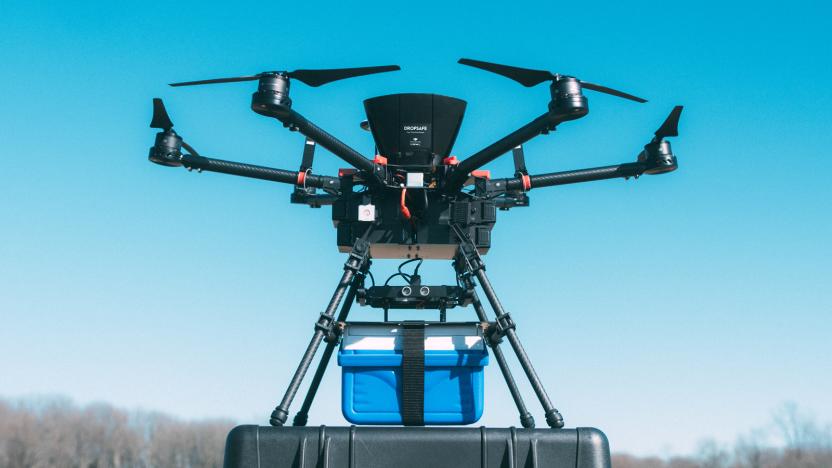
Drones can safely carry blood bags
Paramedics and rescue teams can't always afford to wait for blood supplies, especially when they're in remote locations where most vehicles would take too long (or can't visit at all). However, they might not have to worry for much longer. Johns Hopkins researchers have determined that it's safe to carry large bags of blood products (such as transfusions) using drones. In a study, they discovered that the robotic fliers didn't affect the chemical, hemotological or microbial traits of samples flown at an altitude of 328 feet, even when carrying it as far as 12 miles away. So long as the blood is kept in a temperature-monitored cooler, it's usable almost right away.

Scientists developed a USB stick that can perform an HIV test
When is comes to HIV tests, a drop of blood and a USB stick may be all patients need in the near future. Scientists at the Imperial College London developed a device with the help of medical testing company DNA Electronics that detects HIV levels in the bloodstream and creates a signal that can be read using a computer or handheld gadget. The disposable testing units could be used to help HIV patients monitor their treatment as well as improve how doctors manage the virus in remote locations.

Walgreens sues Theranos for a reported $140 million
Walgreens is taking Theranos to court for $140 million, according to Wall Street Journal investigative reporter John Carreyrou and a motion filed today in Delaware district court. The details of the case are secret, as the companies both signed non-disclosure agreements that could be violated if Walgreens' actual complaint were made public.

Drones are delivering blood to hospitals in Rwanda
In Rwanda, transporting critical medicine and blood can be difficult if the patient is in a remote location. Heavy downpours can wash out the roads, and local hospitals are often too small to stock everything their doctors might need. Now, the Rwandan government is side-stepping the problem with a drone delivery program. In the western half of the country, 21 transfusion clinics can request batches of blood via text. The order will be picked up by Zipline, a California-based robotics firm, at its "nest" base in Muhanga. A small drone will then be deployed and, upon arrival, swoop down low to drop the package off at a designated "mailbox" area.

FDA approves first automated insulin system for type 1 diabetes
For diabetes patients, managing blood sugar levels through insulin pens, needles or pumps is a necessary hassle -- but it might be far easier to handle going forward. The US Food and Drug Administration has approved the first automated insulated delivery device for type 1 diabetes, Medtronic's MiniMed 670G. The gadget uses a sensor to detect glucose levels under your skin every 5 minutes, and supplies just enough insulin to keep your blood sugar stable. While you do have to trigger a manual insulin dose after meals, you generally won't have to be as involved in the process as before.

ICYMI: NASA is going to colonize a space rock
try{document.getElementById("aol-cms-player-1").style.display="none";}catch(e){} Today on In Case You Missed It: Nasa launched the OSIRIS-Rex craft this week to begin its long and lonely mission to visit the Bennu asteroid. It'll return to Earth in seven years full of space rocks and hopefully nothing else. Meanwhile, Harvard Medical School has devised a way to see how bacteria evolves to become resistant to antibiotics.
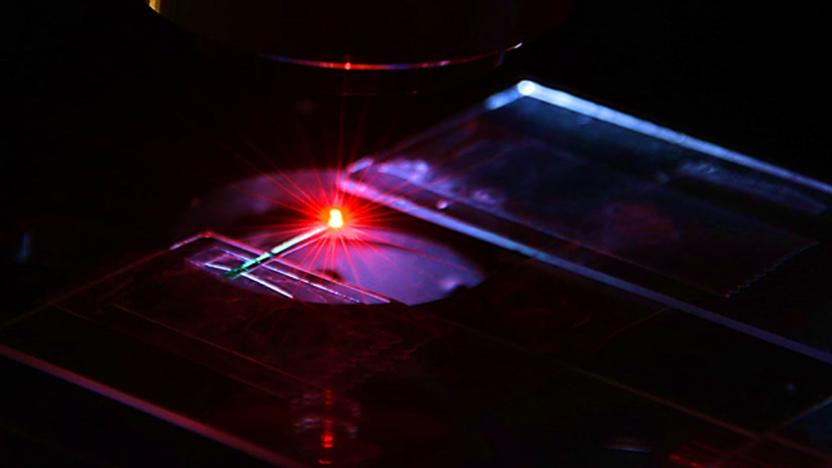
Scientists build a laser using human blood
No, this isn't one of your childhood sci-fi dreams brought to life -- it's real. University of Michigan researchers have developed a medical observation laser where human blood is a key ingredient. When the team shined a laser into a small cavity full of dye-infused blood, they discovered that they could process the laser's light according to their needs. They could amplify the light to exaggerate small changes in cell activity, or filter it to reduce background noise. Existing techniques combine dyes with infrared or visible light in a way that makes it difficult to spot tiny differences.

FDA recommends that all donated blood be tested for Zika
In light of the Zika virus rapidly spreading to other parts of the world, the Food and Drug Administration has changed up its recommendations for donated blood. Going forward, all blood donated in the United States should be screened for the Zika virus.

Walgreens is done with Theranos
After months of screaming at Theranos to clean up its act, Walgreens has formally ended its partnership with the blood testing startup. The pharmacy chain said that the CMS' recent rejection of Theranos' recovery plan and the looming threat of sanctions forced the relationship to end. Walgreens will now close all 40 of its remaining Theranos Wellness Centers in Arizona and "transition" customers to more reliable testing methods. Such as casting bones, consulting the tree spirits or looking at your wrist and then just guessing what's wrong with yourself. Walgreens was Theranos' main source of business, and without those retail locations, it's not clear how the startup is going to survive.












